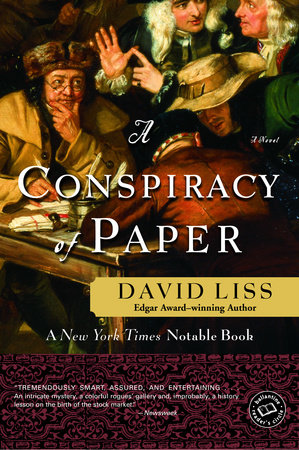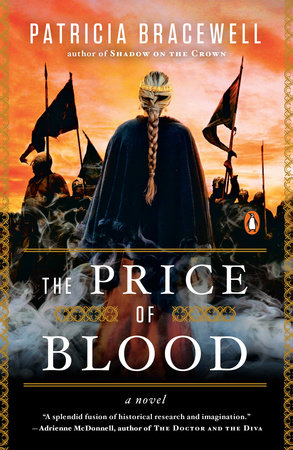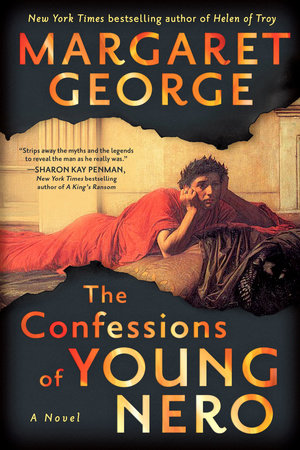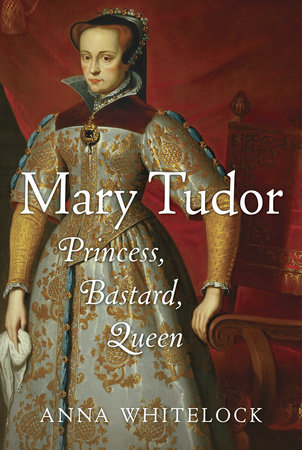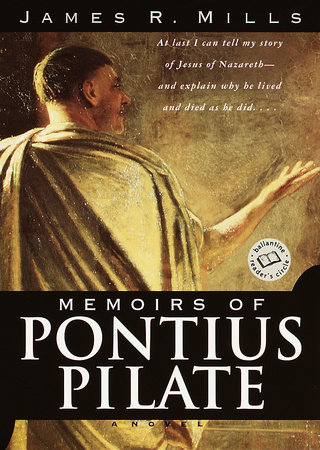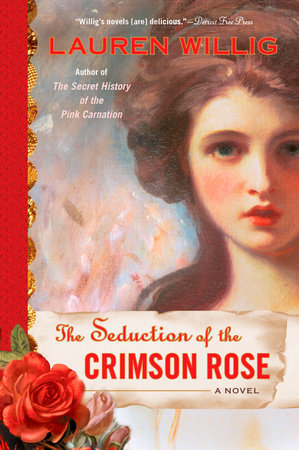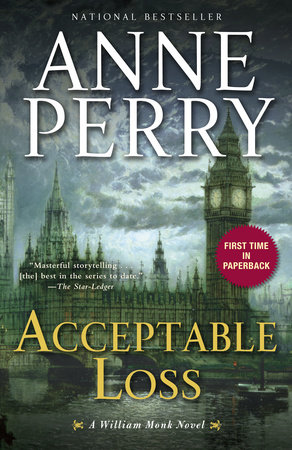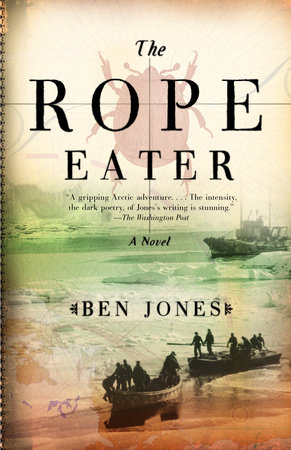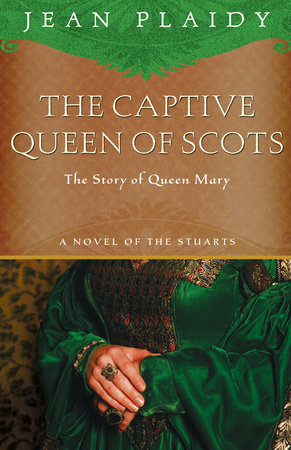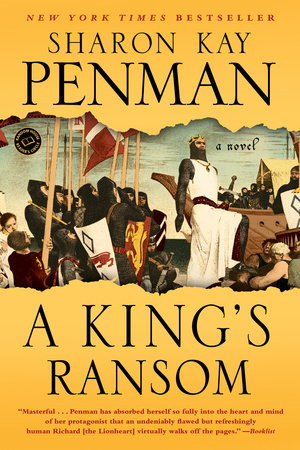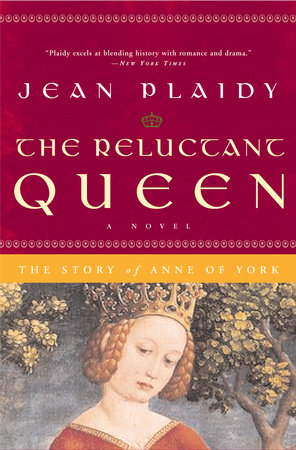A Conversation with David Liss
New York novelists David Liss and Sheri Holman met at a literary roundtable breakfast in Toronto while both were out on lengthy book tours. Sick of room service and eating dinner alone too often, they went out that evening–staying up far too late, over far too many bottles of wine, a great friendship was born. Among the many common bonds Holman and Liss share are a love of baseball, spouses in academia, and gourmet cooking. Ballantine Reader’s Circle thought it might be fun to have these two friends interview each other about their mutual passion for history and how they put it to work in their novels.
Sheri Holman is the author of A Stolen Tongue, translated into eleven languages worldwide, and The Dress Lodger, nominated for an IMPAC Dublin Literary Award. She is currently at work on her third novel, The Mammoth Cheese. You can read David Liss’s interview of Sheri Holman in the back of the BRC edition of The Dress Lodger, due out in Spring 2001.
SH: I know you wrote Conspiracy of Paper while pursuing your doctorate at Columbia. How did the novel grow out of your studies, and how difficult was it to make the switch from academic writing to fiction writing? Would you like to share with your readers your first title for this book?
DL: I originally enrolled in graduate school because I figured that I couldn’t make a living writing fiction, and writing about and teaching fiction seemed like the next best thing. I often found myself looking at my research in light of my interest in fiction, however; when I’d come across an interesting event or figure from the historical record, I would often think, Hey, that would be great in a novel. When I decided to try my hand at fiction again, it seemed natural to take the material I’d been researching for my dissertation and attempt to turn that into a narrative of some kind.
In a way, I found it very easy to switch from academic writing to novelistic writing. Writing a novel offered me the freedom to work outside the bounds of what I could actually prove. I loved writing dialogue and constructing characters. In fact, what I found difficult was returning to academic writing once I had begun working on the novel.
Originally, I though I would be able to switch back and forth between the two projects fairly easily, but that turned out not to be the case. I had no problem getting into a fiction-writing frame of mind, but it took a lot more work for me to get to where I could write academic prose constructively. As a result, I segregated my time so that I worked on the dissertation during the semesters and the novel during the breaks.
As for the original title, I originally wanted to call the novel The Villainy of Stock-Jobbers Detected, a name I swiped from a hyperbolic pamphlet of Daniel Defoe. I thought it was wonderful and absolutely evocative of the period, but whenever I mentioned it to anyone I would get pretty unfavorable responses–usually mock gagging.
SH: Can you tell us a little bit about Daniel Mendoza, the Jewish boxer upon whom Weaver is based? How were they alike? What did you change for dramatic purposes?
DL: I came across Mendoza’s memoirs–sadly, now out of print–while doing research on my dissertation, and he turned out to be a great example of someone I thought would be perfect in a novel. He fought toward the end of the eighteenth century, and his career was remarkable for a number of reasons, among which is that he was probably the first national Jewish sports hero. Everyone, from the King on down, knew his name and followed his exploits. And in perfect eighteenth-century fashion, he took something that had been some-what chaotically arranged–the sport of boxing–and turned it into an organized and structured system. He invented what he called the "scientific method of boxing," in which he worked out a theory of moves and punches and so forth. But unlike athletes today, he did not make much money, despite his success, and when he retired he hired himself out as a debt collector and all-around tough guy.
When I started working on Conspiracy, I loved the idea of doing something with Mendoza, but I wanted to set the novel at the beginning of the century, just prior to the South Sea Bubble. So I took a number of elements from Mendoza’s biography and altered them–changed the way he would have boxed and thought about boxing, the kinds of opportunities available to Jews at the time, and so forth. Weaver is certainly not Mendoza simply placed in another time, but he is inspired by Mendoza in many ways.
SH: You’ve portrayed the insular Jewish world as overbearingly patriarchal. How true to history is Miriam? Would she have been able to control her own money, or would she have stayed a prisoner in her father-in-law’s house? What exactly was the role of women inside places like Broad Court?
DL: If anything, I’ve exaggerated Miriam’s freedom, not her lack of freedom. Miriam comes from a Jewish family of Portuguese origin, and the combination of Jewish patriarchy and Iberian patriarchy produced a culture in which women were horribly oppressed. In truth, it would have been very difficult for her to strike out on her own, even if she had money, and only an exceptional woman would have been able to conceive of doing so. In her culture, the far more expedient thing to do would be to find a husband and run his house for him. Her role would have consisted of little more than making certain that the house was maintained according to Jewish ritualistic standards and supervising the servants.
Of course, this kind of oppression existed in British Christian culture as well, though perhaps not quite in so pronounced a way, and in this period many women began articulating their displeasure with oppressive patriarchy and lashing out against it. Women ran salons and placed themselves at the center of social circles, and British Jewish culture, at least in many cases, was not isolated enough to be uninfluenced by these movements.
SH: Elias gives Weaver a wonderful lesson on the nature of new finance using the metaphor of the clipped shilling. He then goes on to say, "These financial institutions are committed to divesting our money of value and replacing it with promises of value. For when they control the promise of value, they control all wealth itself." What parallels do you see between that philosophy of finance and today’s Internet frenzy? Did you write with the present always in mind?
DL: Today, as in 1719, we live in a world in which the representation of money is undergoing a major change. In the early eighteenth century, gold, which many imagined to have real, intrinsic value, began to be replaced with paper money, which we casually imagine as actually having value, is being replaced by abstract electronic money, and the same concerns appear: How do we know these abstract ideas about money are not being manipulated by the powerful for their own benefit? I certainly had these concerns in mind when I began working on Conspiracy, and I was also interested in the stock market.
In recent years, a number of scholars have begun writing about the eighteenth-century financial markets, and the fact that so many people are suddenly drawn to this topic suggests that something in our own cultures makes it relevant. However, in the time between the sale and the publication of the novel the stock market heated up considerably, and in that sense I guess I should say that I just happened to invest wisely in the right topic.
SH: The time you write of, just before the South Sea Bubble, was a very heady time for the emerging British middle class. Can you tell us a little about what happened after the crash? Did things go back to normal? What opportunities did the new finance make possible?
The crash of the South Sea stock produced an intense and immediate response. There were parliamentary inquiries, unruly crowds, calls for blood in the newspapers–but in the end, not much came of it. Parliament passed something called the Bubble Act, which prohibited companies from issuing stock unless they were sponsored by the government, but that was about the extent of the official response. None of the South Sea directors suffered in any serious way. Actually, the government considered the South Sea scheme a success–its goal had been all along to get holders of high-interest bonds to trade in their holdings for South Sea stocks. Most of these investors did so and thereby helped to reduce the national debt. The fact that many investors were ruined seemed beside the point. Ultimately, the Bubble did not change that much, because, despite the ruin it caused, it did not change the essential fact that anyone with money had to invest in the government or in corporate funds, since not earning interest on money is pretty much the same thing as losing money. For the rest of the century, Britons continued to have a very uneasy relationship with the concept of investment.
The thing I find most surprising is that the South Sea Bubble does not remain a rallying cry for very long. There are very few references to it in any kind of literature after about 1730, only ten years after the collapse. However, a strong suspicion of the stock market and investment remains firmly in place for the rest of the century. Many novels present stock trading and Exchange Alley in the most critical terms, but they do so without mentioning the Bubble. Nevertheless, it has long been my theory that the Bubble shaped the British novel, which emerged in its modern form around 1740 (this is an arguable point, but I’m sticking to it). These mid-century novels are preoccupied with the sudden loss or the sudden appearance of wealth because the novelists came of age during the period of the Bubble and its aftermath.
SH: The Jewish community in Conspiracy of Paper is isolated within British society, yet at the same time, its members marginalize the Eastern Europeans among them. What was the hierarchy inside this closed community, and what were you trying to say about intolerance by introducing the old Tudesco Jew? What were you trying to say about Weaver’s ambivalence?
DL: I found it fascinating to write about Jewish characters in this period because the kinds of sweeping intellectual changes brought on by the Enlightenment allowed for Jews to think about themselves in entirely new ways. For the first time, someone like Weaver could imagine his Jewishness as linked to an ethnic identity rather than a system of belief or practice> To do so, however, means that he has to make a number of decisions about his Jewish identity, and that is a very modern way of thinking about religion.
The division between the Iberians and the Tudescos–or the Sephardim and Ashkenazim, as we would say today–is a longstanding one. The two traditions are in many ways very different, and in this period the differences were only becoming more pronounced with the rise of the ecstatic movements among Eastern European Jews. Wherever these two populations lived together, there always seemed to be a certain amount of suspicion and hostility, which, sadly, is just human nature.
SH: London as you portray it was a pretty lawless town. Before the advent of a police force in the nineteenth century, was there anything in place to check the excesses of men like the historic Jonathan Wild? Did his influence really stretch into areas such as high finance? How does Weaver prefigure later detectives?
DL: In eighteenth-century propaganda, Britons embraced nothing as strongly as they did the somewhat vague notion of liberty, and anything that threatened liberty was intolerable. The British associated a police force with the absolute rule of the oppressive French government–the idea that a policeman could approach a gentleman and arrest him struck many people as an outrageous infringement upon the gentleman’s liberty.
Naturally, this kind of environment bred wonderful opportunities for a schemer like Jonathan Wild, who took advantage of both the society’s lawlessness and the fundamental desire for some kind of check on that lawlessness. Wild had his fingers in a number of pies, though we don’t know as much about his operations as we would like to. He owned smuggling ships, he had spies in major port cities, and he certainly took advantage of the buying frenzy of the South Sea period, though there is no record, which I am aware of, that he actually traded in financial instruments.
I always take great pleasure from the fact that the father of the London police force is the novelist Henry Fielding, who, in addition to famous works like Tom Jones and Joseph Andrews, also wrote a highly fictionalized account of the life of Wild. While not writing novels, Fielding served as a London magistrate, and he organized a group of men called the Bow Street Runners who would attempt to apprehend criminals and bring them to Fielding’s court for processing–and these men are generally acknowledged as London’s firs protopolicemen.
One of the real challenges for me was to create an early-eighteenth-century detective who thought in early-eighteenth-century ways. The kind of inductive reasoning that we associate with modern detective work, such as the use of clues to draw conclusions, just began to take shape in this time, and, as I try to demonstrate in the novel, this kind of thinking emerges as a result of speculative finance. One kind of speculation leads to another. Weaver could not have instinctively known how to use clues like a modern detective would–he had to use financial theory to figure out how to do so. I enjoyed writing those portions of the novel in which Weaver puzzles out new methods of detection.
SH: This novel is very suspenseful, but it’s also very, very funny. How much did you draw on eighteenth-century novels? How did you tackle the problem of archaic dialogue?
DL: I had been reading eighteenth-century novels for such a long time that in some ways it was a relief to be able to write in that idiom without looking foolish. You can’t really go around in public saying, for example, that you don’t care a fig for something, and expect people to treat you like you’re not really, really weird. Nevertheless, the language remained a tricky issue. I didn’t show anyone any portion of this novel until it was almost finished, and more than anything else I was concerned about the period tone not working.
I tried to strike a balance between a real eighteenth-century prose style and something that would be fun for contemporary readers. I started writing the book in a third person voice, but I found it almost impossible. I then came up with the idea of using Weaver as a narrator, which meant reworking the novel in fairly serious ways, since I had imagined various scenes in which the reader would know more or less than Weaver would, but in the end I found the setback worthwhile. Once I started writing in Weaver’s voice, the work went much more easily. It also allowed me to indulge in more humor than I would have thought appropriate.
When I first started writing I had the very silly idea that historical fiction must be serious, and that means that there can be no humor. However, I instinctively gravitate toward characters who want to say funny things, so having a protagonist with a sense of humor turned out to be a good way to solve the problem.
SH: Conspiracy is obviously a major theme in this book. How much of the intrigue surrounding the South Sea Bubble is based on fact, and how much of it did you created for the novel?
DL: Almost nothing that happens in the novel actually happened in real life. From the beginning, I wanted to stay away from dramatizing a real historical event because I felt uncomfortable with the kinds of limitations those projects present. I wanted to be able to make plot decisions based on my desire to tell a story rather than on what actually happened, and I didn’t want to have to worry about misrepresenting people who really lived. Instead, I chose to take my interest in the origins of the stock market, and the kind of frenzy and paranoia associated with this time, and tell a story that would articulate the mood of early eighteenth-century London.
The conspiracy–the idea that there is something going on that others know about but you don’t–is a very modern kind of concern because it assumes that you, the individual person, have a right to know what people in power are doing. This attitude emerges with the rise of literacy and print culture and newspapers, and a place like the British Isles in the eighteenth century with its coffeehouses and other forums for public discussion was ripe to start worrying about conspiracies. Most of the documents written against the South Sea Company, Exchange Alley, and Stock-Jobbers, use conspiratorial Language: These bad men are up to something, they’re keeping secrets from us so they can take advantage of our ignorance. In the end, I was more interested in capturing that concern than I was in documenting real activity on the Exchange.
SH: You’re said in interviews that you’ve become more observant in your faith as you’ve gotten older. Did working on this novel help that along, and if so, what did Weaver’s journey teach you about your inner-life?
DL: I think I found writing about Weaver useful because it helped me to articulate for myself the problems of being Jewish in a secular environment and the difficulties in having to make decisions about how to observe or not observe. I grew up in a very secular household, and only as an adult did I begin to rethink the decisions that my parents had made about Judaism. In many ways, selling the book helped to facilitate this process for me.
Doctoral candidates face pretty intense demands on their time, and the truth is that whenever I read a book that did not advance my research, I felt horribly guilty (this attitude represented a definite improvement over the period in which I would resent showering because it took me away from my research). I often felt that if I had more free time, I would want to pursue more vigorous Jewish studies.
After I sold the novel, I almost immediately enrolled in a class to learn Biblical Hebrew, which has turned out to be one of the most intellectually rewarding projects I’ve ever engaged in. I think I am at a point in my life where I want to make careful and thoughtful decisions about how I choose to pursue religious practice; the fact that I was not raised to keep kosher or put on tefilin, for example, no longer seems like a sufficiently good reason to not do those things.
SH: I think you’ve created a brand-new genre of fiction: the historical-financial thriller. What interests you about the history of finance? Are you planning on continuing Weaver’s story in any fashion?
DL: I first became interested in finance in eighteenth-century literature because so many characters in these stories (like the people who wrote them) are obsessed with their own debts–and as a graduate student faced with frightening credit card bills each month, I found myself drawn to these narratives. To understand the social function of debt in literature, I wanted to link private debt to concerns about public debt, and so I began to learn about finance.
When I decided I wanted to try writing a novel, I thought it natural to make the material I already knew and create a story around it, but it also seemed to me that finance can be the stuff of exciting fiction. Major changes in the way in which people imagine money or do business present opportunities for shifty minds–our own period has demonstrated that repeatedly.
The novel I am working on now is set in the seventeenth century and concerns a plot to corner the market on a newly emerging commodity, and again, the novelty of the idea–that an individual trader can create a monopoly for himself–makes for lots of exciting possibilities. The protagonist of this novel, by the way, is Weaver’s grandfather, but he is a very different sort of person that Weaver. After I finish this book, I think I will most likely write another novel with Weaver at the center, though I will want to do something that is very different, and it will almost certainly not be a story concerning finance.






